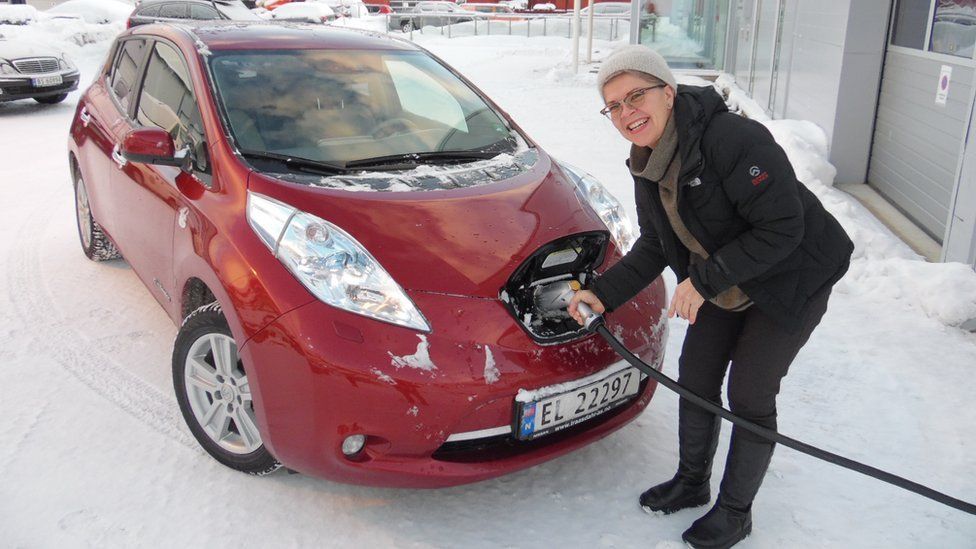Why do they love electric cars in the Arctic Circle?
- Published

Tromso, a Norwegian city known as the "Gateway to the Arctic", receives no sunlight for two months of the year.
Yet this remote, beautiful, snowy city is the unlikely focus of the global electric car industry, attracting the attention of Silicon Valley entrepreneurs such as Elon Musk, founder of electric car maker Tesla.
His company has recently opened a showroom there - its most northerly outpost.
Why? Because Norway, it seems, is simply nuts about electric cars.
The country is the world leader in electric cars per capita and has just become the fourth country in the world to have 100,000 of them on the roads.
When you consider the other nations on the list are the US (population: 320 million), Japan (pop. 130 million) and China (pop. 1.35 billion), then that is quite an achievement for this rugged, sparsely populated country of just five million.
Some of its politicians want to ban the sale of new petrol and diesel cars by 2025, which prompted Musk to tweet: "What an amazingly awesome country. You guys rock!!"
On an earlier visit in April, he attributed a lot of Tesla's success to the country's pioneering stance on electric cars.
So how has Norway managed it?
Elisabeth Bryn helps explain the answer. The 56-year-old teacher enjoys driving in the icy streets of Tromso and she can barely contain her excitement as she misses our turn.
"It is such a good feeling to drive a clean car. It means I have a clean conscience and it works out cheaper in the long run," she tells the BBC.
But it is economic incentive as much as environmental concern that is fuelling the rise in green cars - Norway introduced a raft of generous subsidies to encourage people to go electric.
Norway's green car sweeteners
- No purchase taxes
- Exemption from 25% VAT on purchase
- Low annual road tax
- No charges on toll roads or ferries
- Free municipal parking
- Access to bus lanes
- 50% reduction in company car tax
- No VAT on leasing
It launched an aggressive tax policy towards high-polluting cars, while offering zero tax on zero-emission cars. This "polluter pays" policy brought the cost of an electric car into line with a conventionally powered one.
Bryn is clearly shrewd about the numbers and says the entire cost of her car will be recouped within eight years thanks to the tax and fuel savings.
Free juice
But aren't people worried about running out of power? Lack of range is the electric car's Achilles heel after all.
This is where Norway comes into its own, as Bryn demonstrates at a public charging point on an industrial estate out of town.
The electricity being pumped into her car is free.
Norway is fortunate enough to have close to 100% renewable and cheap hydro power production.
According to the Norwegian Electric Vehicle Association, even if all three million cars on the country's roads were electric, they would suck up just 5-6% of the annual hydro power electricity production.
Rapid charging points can pump her Nissan Leaf with up to 80% charge in just 30 minutes. Alternatively, Bryn can charge her car at home at a much slower pace overnight.
It helps that Norway is also the biggest oil producer in Western Europe and the world's third largest exporter of natural gas. In other words, Norway is rich enough to subsidise its electric car lifestyle.
Range anxiety
But despite these considerable perks, not everyone is convinced.
In Oslo there are more than 14,000 electric cars - about 30% of the market. But in the more northern reaches - cities like Tromso - enthusiasm has been more muted.
This may be explained by the tough terrain and "range anxiety" - concerns that a flat battery will leave them stranded in arctic conditions.
Studies have shown that electric car performance can deteriorate markedly in extreme cold or hot conditions. And Nissan, whose Leaf model is the biggest selling electric vehicle in Norway, admits that the car's 124-mile maximum range can fall significantly in icier conditions when the heating, lights and demister are all draining the charge more thirstily.
Bryn says such concerns have put off some of her friends: "They have a cabin deep in the countryside and said they just couldn't trust an electric car to get them there. They said there just weren't enough charging points."
Charging from the front
Yet Tesla's new showroom in Tromso, and the steady growth in the number of public charging points, demonstrates the industry's commitment to spreading the green message no matter how inhospitable the environment.
And the rest of the world is learning lessons from Norway.
Germany has just announced a €1bn (£784m; $1.1bn) incentive scheme to get more consumers buying electric cars, for example.
Christian Ruoff, publisher of US electric car magazine, Charged, sums it up: "Electric car makers in the US see Norway as a window into the future.
"Norway shows that if governments can make electric cars as affordable as petrol equivalents then motorists, even in the Arctic Circle, will buy them.
"It also busts the myths that electric cars and their batteries are only suitable for cities with more moderate climates like Oslo or San Francisco."
Follow Technology of Business editor @matthew_wall on Twitter